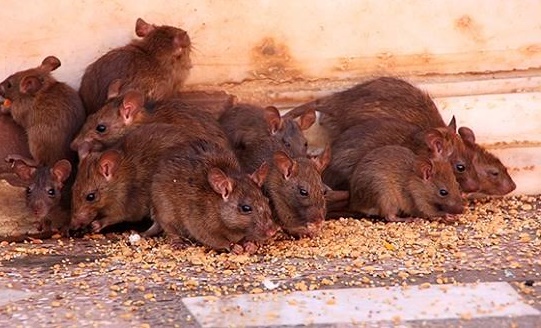On Wednesday, three persons — two doctors and a patient– reportedly died of Lassa fever at the Aminu Kano Teaching Hospital, sending panic across various parts of the state and the country.
A total of 292 persons were also said to have been placed on watch list over the disease.
Here are few things you need to know about the deadly virus.
WHAT IS LASSA FEVER?
Lassa fever, also known as Lassa hemorrhagic fever (LHF), is a type of viral hemorrhagic fever caused by the Lassa virus. Since the first case of the virus was recorded in the town of Lassa, Borno state, in 1969, it has become an endemic disease in the country and several West African countries including Guinea, Liberia and Sierra Leone.
The Lassa virus is predominantly found in a rodent known as “multimammate rat” which belongs to the genus Mastomys. The virus, a member of the virus family Arenaviridae, is a single stranded RNA virus and is zoonotic, or animal borne.
CAUSES AND MODE OF TRANSMISSION
Lassa fever is majorly caused when a Mastomys rat is infected with the virus. When infected with Lassa virus, such rat would consequently excrete the virus in its faeces and urine from where it spreads.
Due to the ability of rats to reproduce quickly, the virus can be transferred from an infected parent rat to the offspring, thereby increasing its circulation.
Human beings come in contact with Lassa virus through many ways. This is probably because rats live in our homes. One of the fastest ways of transmitting the virus is by consuming or inhaling rat urine or faeces. The virus can also be contacted through cuts and open sores as well as when they come in contact with our foodstuffs.
Lassa fever can also be gotten by eating an infected rat. Similarly, other practices such as sharing of needles, blood transfusion, and in some cases, through sex. Lack of proper sterilization used in hospitals can also facilitate the spread of Lassa virus.
However, it is worthy of note that the virus cannot be spread through casual contact (including skin to skin contact without exchange of body fluids). Therefore, you need no run away from those around you, for fear of contacting the virus.
SYMPTOMS
Like other disease outbreaks generally, there are some symptoms of Lassa fever in patients infected with the virus. These symptoms generally take place within 6 to 21 days after a person comes in contact with the virus.
Some common symptoms of the virus include: headache, slight fever, cough, vomiting blood and diarrhea, difficulty breathing, swollen face, pain in the chest, back, and abdomen, high or low blood pressure among others.
If you notice any of these symptoms recurring, seeking urgent medical attention would be a good option.
DIAGNOSIS AND TREATMENT
Due to the nature of the virus, it is a difficult task to diagnose Lassa fever in patients. However, this can be done through laboratory tests which are mostly done in specialized institutions.
The virus can be managed if diagnosed early enough, through the use of ribavirin, an antiviral drug. Others practices such as dehydration of body fluids of those infected and constant treatment of symptoms can also improve chances of survival.
Patients should also receive supportive care consisting of maintenance of appropriate fluid and electrolyte balance, oxygenation and blood pressure, as well as treatment of any other complicating infections.
PREVENTION
While Lassa Fever appears scary and deadly, it can be prevented by applying simple safety measures in your homes. One of such is avoiding the presence of rodents. Proper disposal of wastes, clearing of surrounding bushes among others would go a long way in steering away rodents from your home.
Other safety measures include regular hand-washing, avoid coming in contact with blood or fluids of people who are sick and proper food storage and other protective methods available to you.
With these simple but effective steps, you can mark your family safe from the raging spread of the virus.
Copyright 2025 TheCable. All rights reserved. This material, and other digital content on this website, may not be reproduced, published, broadcast, rewritten or redistributed in whole or in part without prior express written permission from TheCable.
Follow us on twitter @Thecablestyle

